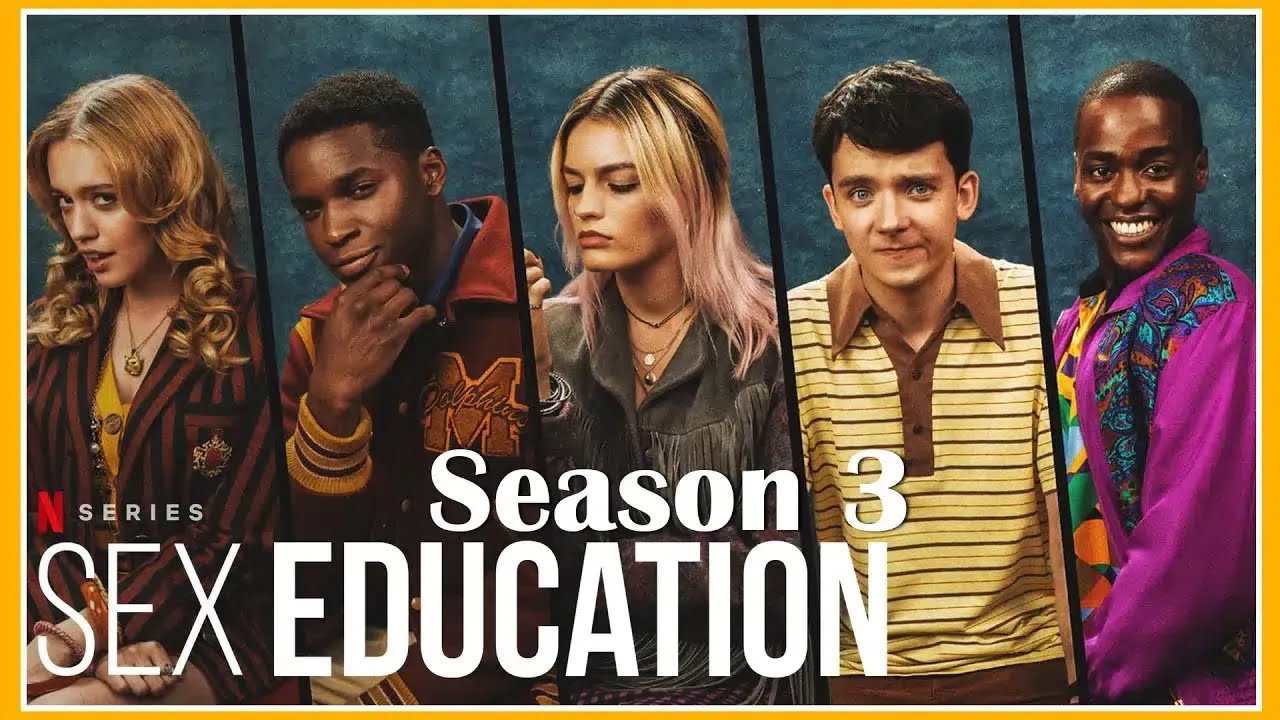“The past shows us what is possible – and we return, again and again, to its arrangements: the ordering of bodies and spaces, hierarchies and narratives, containments and exclusions,” reminds Caroline Levine in her 2015-book Forms: Whole, Rhythm, Hierarchy, Network. The purpose of this text, to put simply, is to see how forms—political, social, aesthetic, and literary—order our existences, but the radical intervention is to say that a more productive way forward for progressive politics might be to use these various forms in all their abundance and glory for re-organising and re-moulding the social world.
Season 3 of Sex Education on Netflix is a rich playing-field for how sex, education, gender, and everything used to seemingly control us, contain us, and regulate our lives, can be radically powerful for shaping a politics of progression, if these forms collide and engage. Levine further adds, “All of these have mattered to us because these configurations are the stuff of injustice, and also because structures like these travel and persist, continuing to organize our lives.” And the latest season delving into Moordale’s shenanigans brings together the cinematic and the socio-political, the power and confines, and the sex and the education in a way you can return to, time and time again, to seek a modern binge-watch escape but also some meaningful answers.
This time in Sex Education, set in the final year of high school, the stakes have matured and heightened from the love interests and exploration of ideas in Season 1 to Season 3’s turn towards boundaries between the individual and the community and how the Self and the Other interact in a setting seemingly small (i.e. the school).
This time in Sex Education, set in the final year of high school, the stakes have matured and heightened from the love interests and exploration of ideas in Season 1 to Season 3’s turn towards boundaries between the individual and the community and how the Self and the Other interact in a setting seemingly small (i.e. the school).
We know the cliffhanger of Isaac (a memorable George Robinson) hindering the way for Otis (Asa Butterfield) and Maeve (Emma Mackey) in adolescent and ill-intentioned authority, but the show moves beyond the will-they-won’t-they trope (or creative trap in a way) to the more jarring and realistic issues of communication, entitlement, and expectation in friendships and romantic relationships. Aimee (a stellar Aimee Lou Wood), the “people-pleaser,” is also the sexually-abused from Season 2, and a significant part of her character’s journey this time is centered on speaking her truth to articulate her trauma and process it. The dynamics of communication among teenagers can be angst-ridden and near-frustrating for relatively older people, and in the lens of a lesser-series perhaps this would have been the case. But Sex Education knows that hindered communication is more than just deleted voice-mails – it, in fact, drives the conflicts of gender identities, bodily dysmorphia and its anxieties, the processing of trauma, and the individual’s relationships with the multiple communities they inhabit.

The ‘sex’ in Sex Education, in what is its most refined season yet, takes on from this motif of communication and builds on it, deconstructs it, and collides with it to produce some neat and brilliant results. Unlike Mad Men’s Don Draper who used sex and physical intimacy in a way to dissociate from his existential dread, turning it into an instrument of betrayal and the death of innocence in all his relationships, or the usage of sex in other young-adult pop culture (Gossip Girl and Riverdale, for starters) to show defiance, deviation, or portray anxieties of the self, Sex Education values it as a part of the politics of human identity. There are all kinds of sexual interactions—casual, extraterrestrial and fantasy-driven, sext-based, long in the making, and completely unpredictable—but the series uses an accommodating gaze to depict the ease, discomforts, and harmony as the situation demands.
In a particularly memorable scene, two people develop intimacy by actively asking what the other individual is feeling. It is an incredibly well-written and thoughtfully performed expression of desire, which is not just carnal passion but, in a post-millennial society trying to value consent, desire becomes gentle, kind, and intensely desirable too.
This tendency of the series paves the way for a subtly-portrayed, integral performance of the blending and engaging of the Self with the Other. In heteronormative sexual performance, historically, woman has been treated as the object—something to whom sex happens—while the man has been the subject of agency – the chooser, the doer, the performer of the act. When Adam (Connor Swindells), who has battled with internalised homophobia directed towards himself and others by being a bully in earlier seasons, shares with Eric (Ncuti Gatwa) that he wants to be penetrated instead of being the penetrator, Sex Education does its finest of injecting easy humour and comfort into a socio-culturally loaded, anxious moment for Adam.
When Adam (Connor Swindells), who has battled with internalised homophobia directed towards himself and others by being a bully in earlier seasons, shares with Eric (Ncuti Gatwa) that he wants to be penetrated instead of being the penetrator, Sex Education does its finest of injecting easy humour and comfort into a socio-culturally loaded, anxious moment for Adam.

The education in this season uses the aforementioned possibilities within sex and physical intimacy to take the preaching of ’embracing and loving yourself as you are’ a notch further, showing how these moments around sex can actually be the foundation of accepting the Other, the one beyond your immediate self, even before the physical communion. The win for the creators, and the audience as well, lies in the tone of Sex Education, which is cautious of talking at you, and shows you what it means to accept the perceived Other with delicate brilliance.
However, one does feel that loose ends come together a little too neatly in maturity and wisdom beyond these characters’ teenage years. The dynamic of an uncanny friendship shown between Rahim and Adam, and the relationship portrayed between Maeve and her mother, among other things, seem too good to be true and perhaps needed not to be there in their well-wrought form, to sustain the relatability with the mess, chaos, and longings of growing up in an imperfect world. Hope, the new headmistress, is presented as a strict disciplinarian, who may remind us of our own schools more vividly, where the uniforms were to be proper and prim as an instrument of control, makeup and accessories which distinguished people were deemed deviant and rebellious, and the anxieties of adolescence (including gender and sexuality) were summarily dismissed as insignificant, a speck in the vastness of adult, mature, aged universe. But her humanisation is half-baked, and we feel distanced, disconnected, and completely unfamiliar from her maternal and marital struggles.

What stands out, apart from the pensive writing of humour and humanity, is the acting prowess of the cast. Butterfield, Mackey, Gatwa, and Gillian Anderson (Jean Milburn) shine in their several moments consistently as they have done in the previous seasons, but Mimi Keene’s Ruby and Connor Swindells’ Adam are my personal winners of the performance spotlight. A peek into Ruby’s family, her home, and her relationship with her father spins the common trope, wherein the troubled teenager with family problems and embarrassing home issues is represented as the mean, superior bully. In a scene where Adam breaks down on the bridge while walking home from school, Swindells’ portrayal of heartbreak is restrained genius – a rarity where the actor isn’t acting, or even inhabiting the character, but has taken you, the viewer, in their own craft and you almost become who they are.

Sex Education’s soundtrack this season deserves a special mention as it carefully punctuates post-millennial joys and heartbreaks with almost a nostalgic turn to the likes of Duran Duran, Bill Callahan, and Bowie, among others, and Ezra Furman’s EP infuses an exciting gravity to the series, such that you are left with the taste of the scenes and their memory after the binge-watch.
Levine crucially interrogates in Forms, “Where exactly, then, can we locate the best opportunities for social change in a world of overlapping forms?” Sex Education has no easy answers to these complex questions, but its triumph lies in the measured and invested, tender and intricate, bold and chaotic, and comic and educational investigation of colliding forces and anxieties, which makes us believe temporarily in the middle of a pandemic that we just might be okay.
Also read: Sex Education Season 1 review and Season 2 review.
Anushree is a literature student at Lady Shri Ram College, teller of stories, learner of feminism and a supporter of petting dogs. You can find her on Facebook, Twitter, Instagram and LinkedIn.
Featured Image Source: Netflix




